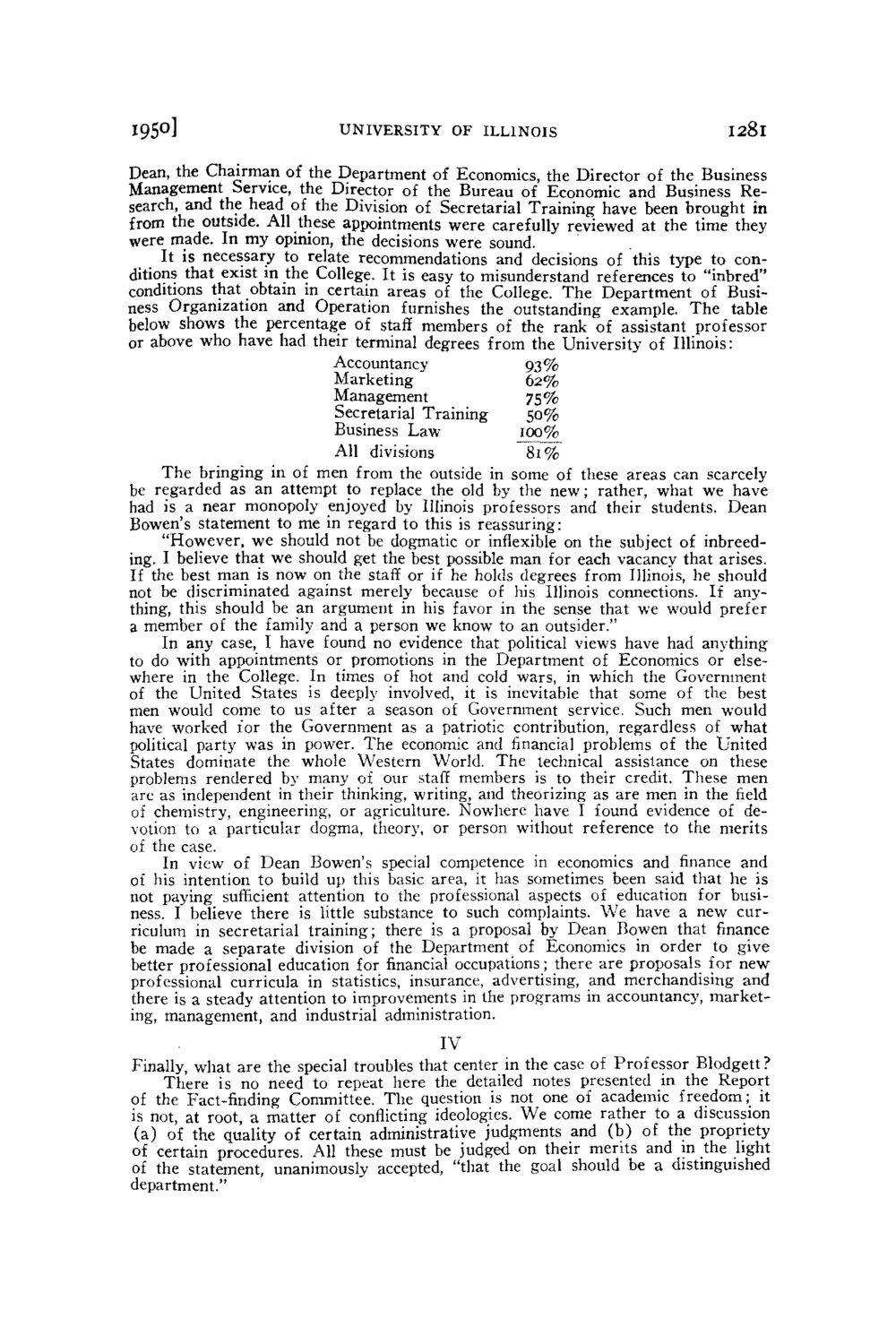| |
| |
Caption: Board of Trustees Minutes - 1950
This is a reduced-resolution page image for fast online browsing.

EXTRACTED TEXT FROM PAGE:
195°] U N I V E R S I T Y OF I L L I N O I S I28l Dean, the Chairman of the Department of Economics, the Director of the Business Management Service, the Director of the Bureau of Economic and Business Research, and the head of the Division of Secretarial Training have been brought in from the outside. All these appointments were carefully reviewed at the time they were made. In my opinion, the decisions were sound. It is necessary to relate recommendations and decisions of this type to conditions that exist in the College. It is easy to misunderstand references to "inbred" conditions that obtain in certain areas of the College. The Department of Business Organization and Operation furnishes the outstanding example. The table below shows the percentage of staff members of the rank of assistant professor or above who have had their terminal degrees from the University of Illinois: Accountancy 93% Marketing 62% Management 75% Secretarial Training 50% Business Law 100% All divisions 81% The bringing in of men from the outside in some of these areas can scarcely be regarded as an attempt to replace the old by the new; rather, what we have had is a near monopoly enjoyed by Illinois professors and their students. Dean Bowen's statement to me in regard to this is reassuring: "However, we should not be dogmatic or inflexible on the subject of inbreeding. I believe that we should get the best possible man for each vacancy that arises. If the best man is now on the staff or if he holds degrees from Illinois, he should not be discriminated against merely because of his Illinois connections. If anything, this should be an argument in his favor in the sense that we would prefer a member of the family and a person we know to an outsider." In any case, I have found no evidence that political views have had anything to do with appointments or promotions in the Department of Economics or elsewhere in the College. In times of hot and cold wars, in which the Government of the United States is deeply involved, it is inevitable that some of the best men would come to us after a season of Government service. Such men would have worked for the Government as a patriotic contribution, regardless of what political party was in power. The economic and financial problems of the United States dominate the whole Western World. The technical assistance on these problems rendered by many of our staff members is to their credit. These men are as independent in their thinking, writing, and theorizing as are men in the field of chemistry, engineering, or agriculture. Nowhere have I found evidence of devotion to a particular dogma, theory, or person without reference to the merits of the case. In view of Dean Bowen's special competence in economics and finance and of his intention to build up this basic area, it has sometimes been said that he is not paying sufficient attention to the professional aspects of education for business. I believe there is little substance to such complaints. We have a new curriculum in secretarial training; there is a proposal by Dean Bowen that finance be made a separate division of the Department of Economics in order to give better professional education for financial occupations; there are proposals for new professional curricula in statistics, insurance, advertising, and merchandising and there is a steady attention to improvements in the programs in accountancy, marketing, management, and industrial administration. IV Finally, what are the special troubles that center in the case of Professor Blodgett? There is no need to repeat here the detailed notes presented in the Report of the Fact-finding Committee. The question is not one of academic freedom; it is not, at root, a matter of conflicting ideologies. We come rather to a discussion (a) of the quality of certain administrative judgments and (b) of the propriety of certain procedures. All these must be judged on their merits and in the light of the statement, unanimously accepted, "that the goal should be a distinguished department."
| |